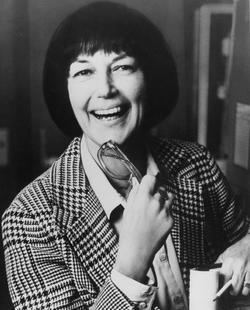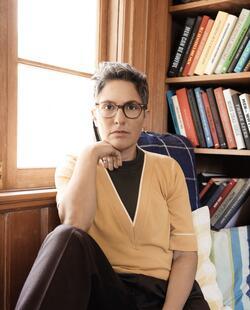Television Trailblazers
Born 50 years apart, screenwriters Fay Kanin and Joey Soloway have both brought deeply feminist sensibilities and highly original subject matter to television. In creating unconventional roles and storylines about women and the American family, both women have radically changed the medium’s landscape – and turned the TV drama on its head.
Over her long career in Hollywood and television, Fay Kanin broke glass ceilings and cultural ground. She counteracted female stereotypes by creating brainy, complicated female characters. At age 19, she boldly marketed herself to Hollywood as a writer, and landed a job at RKO Studios. There she met Michael Kanin, whom she married and teamed up with as one of the most famous screenwriting duos of the 20th century. Together, they wrote popular Broadway plays and several high-profile films for stars such as Clark Gable and Doris Day. Even within conventional Hollywood storylines, Fay shaped women characters who were professors and congresswomen, intelligent and outspoken.
In the early 1970s, Fay went solo after she and Michael agreed their marriage wouldn’t survive the stresses of a professional partnership. Disenchanted with Hollywood, she turned to television as a medium more open to the kind of stories she wanted to write and produce. Kanin was uninterested in conventional women’s narratives—the kind, she once said, in which women were the “wallpaper” around men’s lives. Instead, she wanted to create strong, complex women characters who question, challenge, and struggle. In the 1970s and 1980s, she wrote and produced a series of insightful, Emmy-nominated films featuring multifaceted female characters in challenging circumstances, such as Hustling in 1975, a film about prostitution in New York for which she interviewed prostitutes; Friendly Fire (1979), about the mother of a slain soldier trying to find out the truth of his death; and Fun and Games (1980), the story of a woman enduring sexual harassment on the job. These films, Kanin said, represented “the blossoming of my own personal statements.”
Kanin described herself and her creative sensibility as “feminist” long before the term gained prominence. She was proud to be the first woman to serve a full term as president of the Academy of Motion Picture Arts and Sciences, and went on to hold the position for 15 years. Disrupting a predominantly male industry, Kanin refused to perpetuate feminine tropes and opened viewers’ eyes to the lives American women were really leading. Her belief that “women should never back away from life” informed both the content and the direction of her work. Television’s storytellers have been following in her creative footsteps ever since.
Long relishing edgy, eccentric subjects and challenging their viewers with the unfamiliar, Joey Soloway found their creative calling in 2014 as the creator, producer, and director of the award-winning series Transparent. This show, about a trans woman coming out late in life and her family’s adjustment to their new reality, is rendered through storytelling that taps into something deeply human and universal, and is at the same time stunningly unique.
Soloway became known for writing and producing such offbeat TV series as Six Feet Under and United States of Tara, and won the 2013 Sundance Directing Award for her film Afternoon Delight, the story of a woman who invites a prostitute to live with her family. But their professional epiphany came from a moment of personal upheaval in 2011, when their elderly father came out as a trans woman. While untangling their family’s past, Soloway realized that they had found “the show I've been waiting my whole life to write.”
Transparent is fundamentally a portrait of a family (whose Jewishness plays a significant role in the story), in which a central crisis sets into motion messy, complicated, transformative change. Despite the characters’ self-absorption, they share transcendent moments of family grace, anchored by a patriarch/matriarch discovering her authentic identity. The groundbreaking show is also Soloway’s ode to central character Maura and a platform for transgender acceptance. As such, they feel tremendous responsibility to “get it right.” In Season 1, they hired trans writers, cast, and crew so that their perspective would inform the show. “We’re part of a revolution,” they have said. “We're focusing on changing the world.”
At the same time that they are a proud spokesperson for the trans movement, Soloway has frequently stated that what ultimately informs their work is their feminism. The name of their new production company is Topple (a reference to “toppling the patriarchy”). Their shows are all told from a female point of view. They have alternately described their work as “directing from the vagina” and being a mother figure overseeing their cast and crew (children) on a play date. They view their role on set as fostering the female qualities of creativity, inspiration, and understanding. Embracing both feminist and non-binary gender perspectives, Soloway has irrevocably changed the landscape of TV—and the cultural conversation around identity, gender, and the American family.




